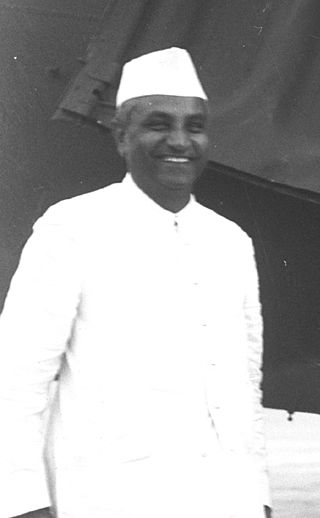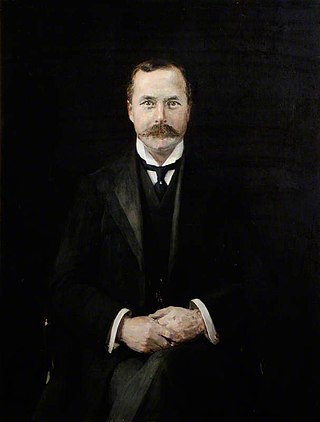
The University of Mumbai is a public state university in Mumbai. It is one of the largest university systems in the world with over 549,000 students on its campuses and affiliated colleges. As of 2013, the university had 711 affiliated colleges. Ratan Tata is the appointed head of the advisory council.
The Grant Government Medical College is a public medical college located in Mumbai, India. It is affiliated to the Maharashtra University of Health Sciences. Founded in 1845, it is one of the oldest medical colleges in South Asia. Its clinical affiliate is Sir J.J. Group of Hospitals, a conglomerate of four hospitals in South Mumbai including Sir J.J. Hospital, St George Hospital, Gokuldas Tejpal Hospital and Cama and Albless Hospital.

The Government Medical College, Thiruvananthapuram, also known as Trivandrum Medical College, is a public medical college in Thiruvananthapuram, Kerala, India. Founded in 1951, it was inaugurated by Prime Minister Jawaharlal Nehru and is Kerala's first ever Medical College.

Baroda Medical College is a medical educational institution for undergraduate and postgraduate medical studies that comes under the Faculty of Medicine of the Maharaja Sayajirao University of Baroda. It is located in the Raopura area at Vadodara, India. It is primarily affiliated with Sir Sayajirao General Hospital. The college was established in 1949.

Ashutosh K. Tewari is the chairman of urology at the Icahn School of Medicine at Mount Sinai Hospital in New York City. He is a board certified American urologist, oncologist, and principal investigator. Before moving to the Icahn School of Medicine in 2013, he was the founding director of both the Center for Prostate Cancer at Weill Cornell Medical College and the LeFrak Center for Robotic Surgery at NewYork–Presbyterian Hospital. Dr. Tewari was the Ronald P. Lynch endowed Chair of Urologic Oncology and the hospital's Director of Robotic Prostatectomy, treating patients with prostate, urinary bladder and other urological cancers. He is the current President of the Society for Urologic Robotic Surgeons (SURS) and the Committee Chair of the Prostate Program. Dr. Tewari is a world leading urological surgeon, and has performed over 10,000 robotically assisted procedures using the da Vinci Surgical System. Academically, he is recognized as a world-renowned expert on urologic oncology with over 250 peer reviewed published papers to his credit; he is on such lists as America's Top Doctors, New York Magazine's Best Doctors, and Who's Who in the World. In 2012, he was given the American Urological Association Gold Cystoscope Award for "outstanding contributions to the field of urologic oncology, most notably the treatment of prostate cancer and the development of novel techniques to improve the outcomes of robotic prostatectomy."

The Regional Institute of Medical Sciences (RIMS) was established on 14 September 1972 in the name of the Regional Medical College. It is situated in a locality at Lamphelpat in Manipur, India. It is run by a society named "North Eastern Regional Medical College Society" which was duly registered under the Manipur Societies Registration Act, 1989.

Jivraj Narayan Mehta was an Indian politician and the first Chief Minister of Gujarat. He also served as the first "Dewan" of the erstwhile Baroda state, and Indian high commissioner to the United Kingdom from 1963 to 1966.

Institute of Post-Graduate Medical Education and Research and Seth Sukhlal Karnani Memorial Hospital, colloquially known as P.G. Hospital, is a public medical college and hospital located in Kolkata, India. It is a national research institute.

Sir William James Wanless FACS was a Canadian-born surgeon, humanitarian and Presbyterian missionary who founded a medical mission in Miraj, India in 1894 and led it for nearly 40 years. As part of this mission, Dr. Wanless founded Maharashtra's first missionary medical school in 1897, and helped to establish a leprosy sanatorium as well as a tuberculosis hospital, now known as the Wanless Chest Hospital.
Keki Byramjee Grant (1920-2011) was an Indian cardiologist from Pune, Maharashtra, one of the first and respected cardiologists in the country and the founder of Grant Medical Foundation, which runs the Ruby Hall Clinic, a nationally accredited hospital in Pune. The Government of India honoured him, posthumously in 2011, with Padma Bhushan, the third highest civilian award, for his services to the medical science.
Shashank R. Joshi is an Indian endocrinologist, diabetologist and medical researcher, considered by many as one of the prominent practitioners of the trade in India. He was honoured by the Government of India, in 2014, by bestowing on him the Padma Shri, the fourth highest civilian award, for his services to the field of medicine. He is a part of the COVID-19 Task Force for the state of Maharashtra, India.
Noshir Hormasji Antia was an Indian plastic surgeon and social worker, known for his pioneering contributions to the treatment and rehabilitation of people afflicted with leprosy. He was the founder of three notable non governmental organizations, Foundation for Research in Community Health (FRCH), Foundation for Medical Research (FMR) and the National Society for Equal Opportunities for the Handicapped (NASEOH), all working in the field of rehabilitation of patients, cured or otherwise. The Government of India awarded him the fourth highest civilian award of Padma Shri in 1990.
Luis Jose De Souza is an Indian surgical oncologist and the founder of Shanti Avedna Ashram, a charitable trust which runs a network of hospices in Mumbai and Goa. He has also contributed to the establishment of Indian Cancer Cell, an educational program co-sponsored by Tata Memorial Centre, Union for International Cancer Control (UICC) and Indian Cancer Society, for creating cancer awareness in schools. The Government of India awarded him the fourth-highest civilian honour of the Padma Shri in 1992.

Tehemton Erach Udwadia was an Indian surgeon and gastroenterologist, considered by many as the father of laparoscopic surgery in India. He was a general surgeon at two Mumbai hospitals, Breach Candy Hospital and Hinduja Hospital and was the founder president of the Indian Association of Gastrointestinal Endo-Surgeons. The Government of India awarded him the fourth highest civilian honour of the Padma Shri, in 2006 and the third highest civilian honour of the Padma Bhushan in 2017 for his contributions to Indian medicine.
Shantilal Jamnadas Mehta (1905–1997) was an Indian surgeon, institution builder and medical academic, who established the Jaslok Hospital and Research Centre, Mumbai. His contributions were also reported in the establishment of Tata Memorial Centre and the All India Institute of Medical Sciences, Delhi. In 1971, the Government of India awarded him the third highest civilian honour of the Padma Bhushan for his contributions to medicine.
Lakhumal Hiranand Hiranandani (1917–2013) was an Indian otorhinolaryngologist, social activist and philanthropist, known for pioneering several surgical procedures which later came to be known as Dr. Hiranandani's Operations. He was the founder chairman of Hiranandani Foundation Trust which runs two schools in India and was reported to have been active in the social movement against organ trade in India. He was a recipient of the Golden Award of the American Academy of Otolaryngology–Head and Neck Surgery, the first Indian and the fifth overall to receive the honour. The Government of India awarded him the third highest civilian honour of the Padma Bhushan, in 1972, for his contributions to medicine and society.
Shantilal Chhaganlal Sheth (1912–1990) was an Indian pediatrician and the president of several medical institutions including the Medical Council of India, the apex body for matters related to medical administration and education in India. An honorary surgeon commander at the Indian Navy, he served as the honorary physician to the President of India. The Government of India awarded him the third highest civilian honour of the Padma Bhushan, in 1972, for his contributions to medicine.
Arjunan Rajasekaran is an Indian urologist and one of the pioneers of male infertility therapy in India. He is a former Professor and Head of the Department of Urology at the Madras Medical College, the founder of Madras Andrology and Assisted Reproduction Research Centre, a Chennai-based male infertility clinic, and a recipient of Dr. B. C. Roy Award, the highest Indian award in the medical category. He heads the National Board of Examinations as its president, the highest academic position in the medical sector in India. The Government of India awarded him the fourth highest civilian honour of the Padma Shri, in 2008, for his contributions to medical science.

Sir Peter Freyer was an Irish surgeon with an expertise in genitourinary surgery, best known at first as an Indian Medical Service (IMS) officer, for making popular the procedure for crushing bladder stones to allow them to be evacuated through the natural passages, a procedure known as a litholapaxy. Following retirement from the IMS after 20 years of service in India, he returned to England and popularized a procedure for benign large prostates. This was known as the suprapubic prostatectomy, a transvesical prostatectomy or the Freyer operation, where the prostate is removed through an abdominal incision above the pubic bone but below the umbilicus and through the bladder, and it included using suprapubic drainage post-operatively.











